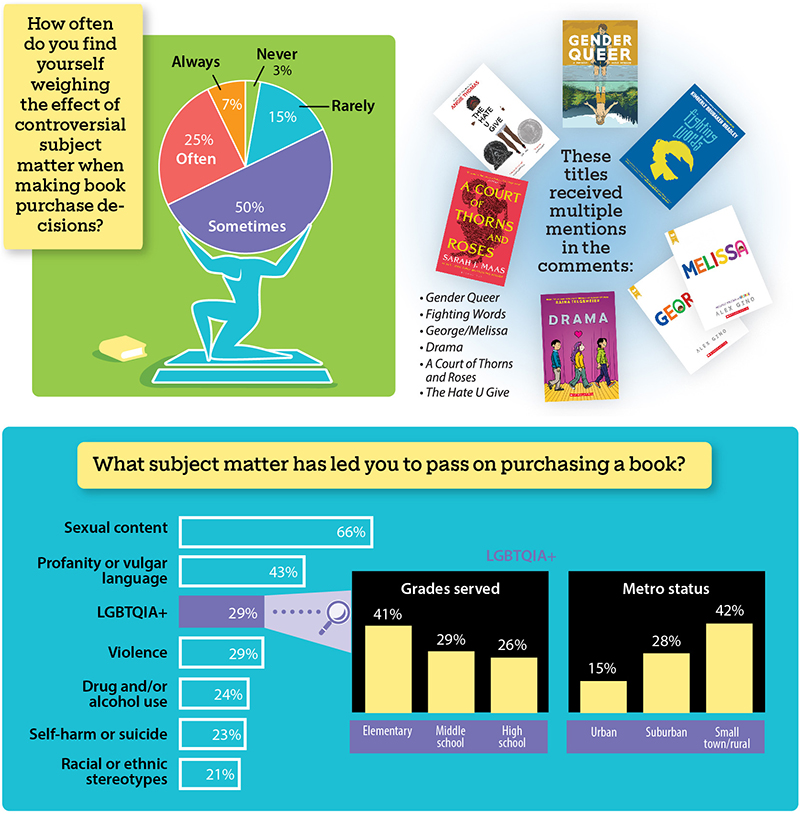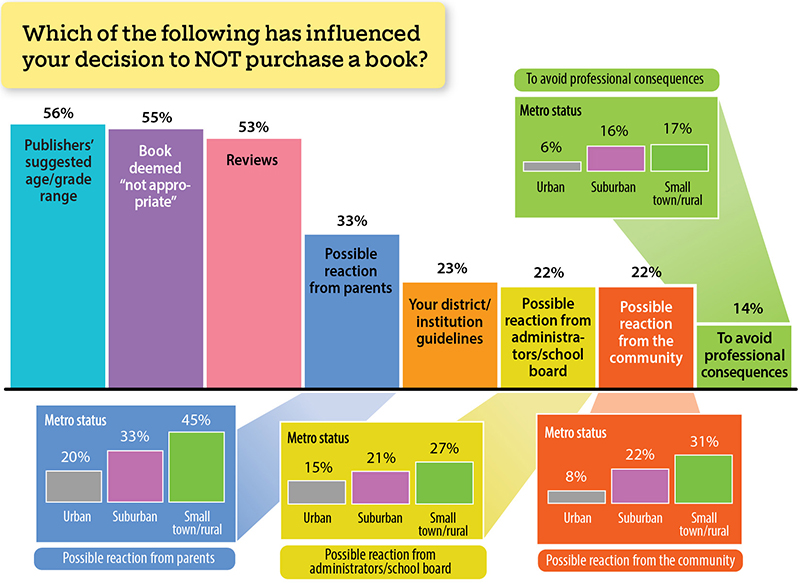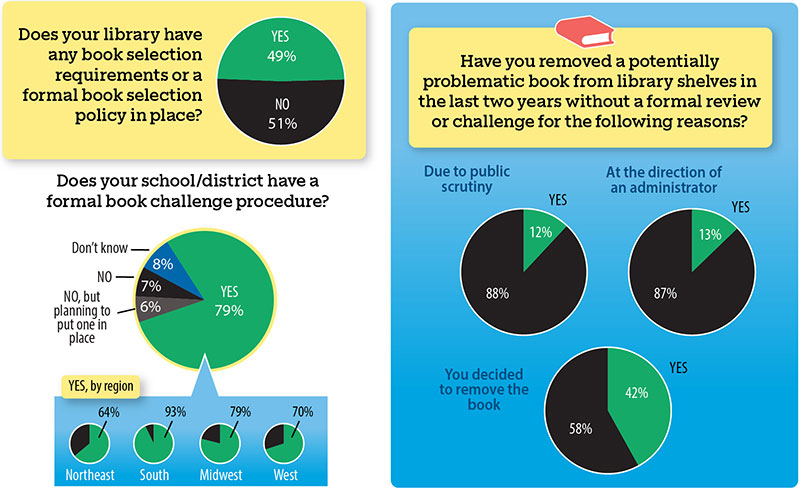Censorship Attempts Will Have a Long-lasting Impact on School Library Collections, SLJ Survey Shows
In the past year, school librarians have faced coordinated, hate-filled censorship campaigns that impact available books and collection development decisions. Here, they share their stories.

There have always been book challenges, controversial titles, and fights over inclusive collections. But in the last year, school librarians have faced a bigger, broader, more coordinated, and hate-filled censorship campaign as politics and the country’s divisive culture wars have moved into school libraries. With an impact on books on the shelves and future collection development decisions across the country, librarians are sharing their stories:
A new school librarian is advised to omit eight books that deal with “nonwhite perspectives on American society and history” from the library inventory of a suburban high school in the Northeast, or the school board will likely decide the newly created librarian position is no longer necessary.
Books with LGBTQIA+ characters or story lines disappear from the shelves, taken by administrators or parents and held out of circulation indefinitely.
A school board member files a criminal complaint against the district administration for having George M. Johnson’s All Boys Aren’t Blue in school libraries.
Reconsideration and review processes are ignored.
There are some victories: challenges fought and overcome, books remaining on the shelves, supportive administrators fighting for a student’s freedom to read. But overall, it is a new and perilous time for school librarians, as shown by these stories revealed in SLJ’s 2022 Controversial Book Survey.
[Also read: Facing Angry Parents? Keep Cool when Adults Demand Book Removal | Scales on Censorship]
In response, many are standing up, fighting back, supporting students’ right to read, and facing difficult personal and professional consequences, according to the survey. Other librarians see their personal beliefs reflected in calls for book removals and are happy to limit certain content from collections. And still more head into the new school year trying to fly under the radar, protect their collections as much as they can, and keep their jobs by avoiding controversy and public attention at all costs.
“I snuck the [challenged] book(s) back in the collection,” wrote one respondent. “I don’t agree with books being pulled, but I am careful with my book purchases now. We had a very controversial book challenge in my conservative school district this past year. I know certain books won’t fly.”
With the survey, SLJ sought detailed information about the impact of the coordinated censorship campaigns across the country on libraries and collection development decisions. Open from May 4 to June 13, the survey received responses from 720 school librarians—all responsible for purchasing books for the library collection, and 90 percent of whom worked in a public school. All responses were anonymous.
“It is not up to me to decide whether a child at my school should or should not read a book based on its content,” wrote one respondent. “What is happening now all over the country is a terrible shame. If we can’t read and learn about all different lifestyles, cultures, religions, etc., how will we ever be accepting of and open to others? We all scream diversity, but then don’t want our children to learn about anything that is different from them.”
Said another, “I think librarians need to find a way to get books into kids’ hands. I got a grant for banned books and gave them away to students. I will keep controversial titles on my back shelf, and students can informally borrow them anytime.”
In 2021, the American Library Association recorded more book challenges—729, affecting nearly 1,600 titles—than in any other year since the organization started keeping records 20 years ago.
While the issue of book banning attempts seems pervasive, the survey shows there is a largely public and performative aspect to the current censorship push. That doesn’t mean it isn’t having an impact, but that the efforts are more often attention-getting, high-visibility acts, e.g., yelling at a school board meeting and pushing for unilateral book removal rather than filing official challenges or following the formal process of reconsideration.
Less than half (43 percent) of respondents had faced a formal book challenge. That is only one percent higher than in 2016, the last time SLJ launched the Controversial Books Survey. The 2022 challenges were nearly evenly spread among grade levels. Geographically, there were significantly more in suburban (47 percent) and small- town and rural (44 percent) districts than in urban areas (31 percent).
Of the 43 percent of librarians who had received a formal book challenge, the book remained on the shelves 71 percent of the time, versus 19 percent of challenges that result in book removal.
For the remaining 10 percent of official challenges, the review process was ongoing at the time of the survey.
Most of the challenges came from parents (80 percent), with teachers and administrators next at 14 percent and 11 percent, respectively.

An insidious effect
But the more insidious aspect of this movement to remove titles from school libraries is the lasting impact it has on collections going forward. The removed books can be documented. What about the ones that never get purchased?
“I was told by my current supervisor to ‘hold off’ on adding some Black Lives Matter–related titles to the catalog as our district’s board of education had requested a list of ‘all the books in the libraries’ of the district,” wrote one librarian. “I believe the intent was to avoid a challenge (or directive from the board) during a review of the collected libraries’ catalogs.”
Of course, purchase decisions don’t always come as a directive. Librarians make buying choices every day. So how much soft censorship and self-censorship is occurring?
Twenty-seven percent of respondents said a formal challenge influenced their book-buying decisions going forward. But there is also an effect on those who haven’t experienced a challenge yet.
“The district book challenge policy protects most of my choices of book purchase; however, sometimes I self-select because of fear for potential challenge,” wrote one respondent.
Asked “How often do you find yourself weighing the effect of controversial subject matter when making book purchase decisions?,” 97 percent said they weigh the impact of controversial subject matter. Nearly a third of those librarians “often” or “always” consider the topics, and half said they “sometimes” do. Data showed this is more common for librarians in small-town or rural schools. A third of urban school librarians said controversial subject matter is “rarely” or “never” a consideration.
LGBTQIA+ content attacked
SLJ asked about subjects that have led to not purchasing a book. Sexual content and profanity or vulgar language were the top two responses, at 66 and 43 percent, respectively. Third on the list was LGBTQIA+ content. The presence of an LGBTQIA+ character or theme in a book led 29 percent of respondents to decline a purchase; that number spiked to 42 percent in small towns and rural communities.
The titles mentioned multiple times by respondents as books they didn’t purchase include Gender Queer by Maia Kobabe, Drama by Raina Telgemeier, A Court of Thorns and Roses by Sarah J. Maas, Fighting Words by Kimberly Brubaker Bradley, Melissa (formerly George) by Alex Gino, and The Hate U Give by Angie Thomas. Three of those six books feature an LGBTQIA+ character or story. A Court of Thorns and Roses, is the first in a series that introduces an LGBTQIA+ character in the third book.
“I have just today given my superintendent information she requested on LGBTQ books received from the Rainbow Library [rainbowlibrary.org] last year,” one respondent wrote. “I annotated the list with the positive review sources, starred reviews, awards, and honors that each book received—which allows me to say I am following the district selection policy for each book. This is in response to a community member’s request for information on ‘this type’ of book. We are expecting some sort of challenge or blowup at a board meeting soon, so I’m getting ready to go to bat.”
“I have only recently begun to select LGBQT+ titles,” another wrote. “These [books] reflect the lives of students and their families, and though I expect difficulty with some titles, the collection is better for them.”
While recent objections to books with LGBTQIA+ content have been widely publicized, anti-LGBTQIA+ sentiment about YA and children’s books is nothing new. Each year, the Top 10 Most Challenged Books list, released by the ALA Office for Intellectual Freedom, includes titles challenged because of LGBTQIA+ characters and themes.
“In my library training, many of the practicing school librarians that I talked to indicated that they self-censor LGBTQ+ books for reasons including: ‘There aren’t any LGBTQ+ students in this school’ (which was incorrect),” wrote one respondent. “It was a choice between doing what’s right and keeping their jobs; they were concerned about parent response. I was told in my previous elementary school by a teacher that elementary students were not mature enough to handle LGBTQ+ picture books, such as Julián Is a Mermaid.”
While many responses reflected a professional mission to provide a diverse collection of windows and mirrors for all students, others showed that not everyone shares this goal.
“The book review process is outdated and should be in the best interest of protecting the child from mature themes,” said one librarian. “Most librarians in schools act like it’s their responsibility to promote books that are not age-appropriate, and this has become problematic and dangerous for young children.”
Wrote another, “I think that sometimes we can get overzealous in our efforts to offer the most well-rounded collection. We end up choosing books that are fine for older kids and adults, but not so much for the younger kiddos whose brains are not as developed enough to be able to process the subject matter. We have to be thoughtful and considerate when we make our choices and not just put something on the shelf because of our own agendas.”

Parsing “age-appropriateness”
Asked what influences the decision to purchase a book, age-appropriateness was the number one deciding factor. For that information, school librarians rely on publishers’ suggested age/grade range, look at reviews, read books themselves, or research the age of characters to decide if a title makes sense for their student population. Despite all those resources, “age-appropriateness” is an inherently difficult measure to apply, as some respondents noted.
“I don’t consider ‘appropriateness,’ because that concept is too subjective to bias,” wrote one. “Instead, I look for relevancy to student experiences, interests, and curriculum.”
“There is a difference between ‘age-appropriate’ and emotional maturity,” responded another. “I like to put everything on my shelves and let students choose for themselves what best fits them. Maybe it means turning the book in and coming back to it at a later point. But I believe that ‘age-appropriate’ doesn’t really matter as much as the student being personal[ly] emotionally ready to handle the material.”
Some admitted to simply going on personal judgment and opinion.
“Would I want my own children to read this? Knowing my students, would this be a good or bad exposure to the subject?” said one.
A third of the librarians consider possible reactions from parents when deciding to pass on a book. Those numbers rise to more than 40 percent of librarians in elementary schools (41 percent) and ones in small-town and rural schools (45 percent).
“I personally don’t want to have an irate parent accuse me of providing materials that they deem inappropriate for kids at the elementary level,” one librarian wrote. “Therefore, I try to steer clear of political topics and mature topics when I order books.”
Twenty-two percent reported not purchasing a book for fear of repercussions from administrators, school boards, or community members.
“If I need to wonder about the reading material creating uneasiness with any stakeholders, it’s a no-go (especially for topics of sexuality and gender),” said one respondent. “Our students and their identities are much more than what they look/feel like. I focus on character development, critical thinking skills, as well as people skills and inspiring improvement in those areas in their reading material.”
One librarian offered a practical reason behind her avoidance of controversial titles.
“My choices reflect more of a budgetary selection rather than a ‘moral’ selection,” the librarian wrote. “I simply don’t have money to buy a book that a parent or administrator will direct me to remove. I frequently explain to my students that I want them to ‘read all the books,’ even the ones I am not allowed to give them, whether because of age, subject, or religious teaching.”
Fear of professional repercussions
Fourteen percent of respondents said they have decided against adding a book to their collection for fear of professional consequences. Some fear possible punishment, including the loss of their job.
Many respondents use reviews to counter issues with administrators and parents. “I have [defused] objections from an administrator when I explained that there were professional reviews to support having a certain title in the library, and I provided those reviews to the principal,” wrote one.
“I occasionally get emails from parents complaining about content. I have always been able to settle the matter by sharing reviews,” said another.
Book-selection and reconsideration policies are meant to counter complaints and challenge attempts. Only 49 percent of respondents have a district selection process, but 79 percent have a formal book-challenge policy in place.
But the policies are often ignored or circumvented.
“Admin refused to acknowledge or abide by challenge policy; wielded their power and discounted the process and my professional input,” said one librarian.
Another wrote, “District admins gave principal permission to remove the book without following the formal process; my protests were overruled.”
“The physical book went to the superintendent’s office, and she kept it, telling me that ‘We’re trying to pass a bond here,’” answered one librarian.
Several survey respondents reported something similar, with administrators, staff, and parents checking out books and never returning them.
“I had a parent steal a book in the fall, although at the end of the year I demanded payment and it was provided,” wrote one. “She said she stole it to prevent any other child from being exposed to ‘gay penguins.’”
One librarian ominously described how a challenged title “disappeared”—it was checked out by an administrator six months before an official reconsideration process began.
Such challenges and public opposition—the creation of controversy around specific titles—will affect what many young readers will find on the shelves in the coming school year, as well as collection development for the foreseeable future.
“I am not enjoying my job as a school librarian as much as I used to,” one librarian admitted. “I seem to question all my purchases and feel as though I’m trying to get around potential problems all the time. No one wants the negative publicity or headaches that come along with a book challenge.”
|
ABOUT THE SURVEY: SLJ’s Controversial Book Survey was emailed to a random sample of U.S. school librarians on May 4, 2022, with a small additional mailing on May 25. In addition, the survey link was advertised via SLJ’s social media channels. The survey closed on June 13, with 720 U.S. school libraries responding. |
RELATED
The job outlook in 2030: Librarians will be in demand
The job outlook in 2030: Librarians will be in demand
ALREADY A SUBSCRIBER? LOG IN
We are currently offering this content for free. Sign up now to activate your personal profile, where you can save articles for future viewing






Add Comment :-
Be the first reader to comment.
Comment Policy:
Comment should not be empty !!!